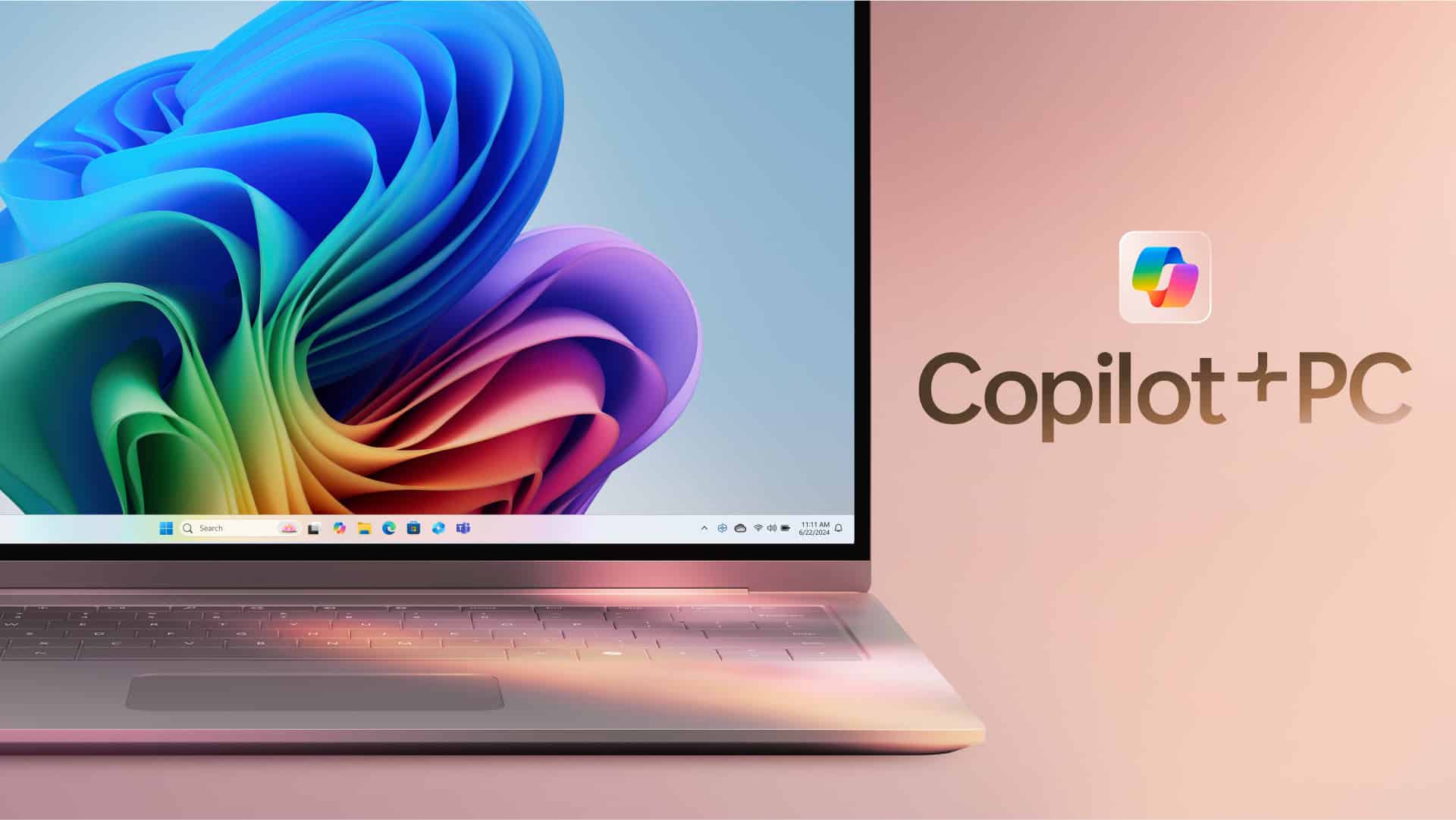AI Copilot PCs are the newest wave of computers from Microsoft. These machines pack a punch with special chips made for AI tasks. They run Windows 11 and come with Copilot, Microsoft’s AI helper, built right in.
Copilot+ PCs offer unique features like Recall, Cocreator, and Live Captions to boost productivity and creativity. These tools tap into the power of AI to help users work smarter and faster. The Recall feature lets you find things you’ve seen or worked on before. Cocreator helps make new images and content. Live Captions turn speech into text in real-time.
These new PCs need at least 16GB of RAM and 256GB of storage to run smoothly. They also have a special part called an NPU, or Neural Processing Unit. This chip helps the computer do AI tasks quickly without slowing down other work. Many big computer makers are joining Microsoft to create these AI-powered machines.
What They Are and What the Benefits Are
AI Copilot PCs are a new class of personal computers designed with built-in artificial intelligence features to enhance productivity, creativity, and everyday computing tasks. These devices combine powerful hardware, integrated AI accelerators, and deep Windows 11 integration to deliver smarter, faster, and more context-aware computing experiences.
Here’s a breakdown of what AI Copilot PCs are—and why they matter.
What Is an AI Copilot PC?
An AI Copilot PC is a Windows laptop or desktop that comes equipped with:
- A dedicated Neural Processing Unit (NPU) for on-device AI tasks
- Microsoft Copilot deeply integrated into Windows 11
- Hardware that meets Microsoft’s new standard for next-gen AI computing
These machines are part of Microsoft’s initiative to redefine the PC experience by embedding generative AI tools directly into the operating system and optimizing the hardware to support them natively.
Key Features of AI Copilot PCs
1. Built-In Copilot Key
A new physical “Copilot” key on the keyboard launches Microsoft’s AI assistant, giving users instant access to help, commands, summaries, and suggestions—similar to how the Windows key works today.
2. Dedicated AI Hardware (NPUs)
Unlike traditional PCs that rely solely on CPUs and GPUs, AI PCs include NPUs (Neural Processing Units). These are designed specifically for running machine learning and AI workloads efficiently and without draining battery life.
3. Real-Time AI Processing
With local AI capabilities, many tasks like voice transcription, language translation, image generation, and text summarization happen instantly and offline, without relying on the cloud.
4. Windows Studio Effects
These PCs support enhanced video calling features like automatic framing, eye contact correction, and background blur—powered by on-device AI.
5. Security and Privacy Enhancements
AI is used for smarter threat detection, adaptive security, and user-aware access controls. Some models may also offer biometric enhancements via AI-powered cameras or sensors.
Benefits of AI Copilot PCs
✅ Smarter Productivity
AI Copilot PCs help you write better emails, summarize documents, generate images, automate repetitive tasks, and get answers faster—all integrated into the Windows experience.
✅ Faster and More Efficient
Tasks that once required online AI services or cloud-based tools can now run locally, saving time and bandwidth while improving response speed.
✅ Improved Battery Life
NPUs are optimized to handle AI tasks at low power, which means better battery efficiency than relying solely on CPU or GPU power.
✅ Enhanced Creativity
Tools like image generators, music suggestions, and AI art assistants can be used in real time—opening new doors for creators and designers.
✅ More Natural Interaction
Voice commands, handwriting recognition, and real-time transcription feel faster and more responsive thanks to AI enhancements processed directly on your machine.
Who Should Consider an AI Copilot PC?
- Students and professionals looking to boost productivity and automate everyday workflows
- Content creators needing built-in AI tools for video editing, writing, or image creation
- Remote workers who rely on video calls and collaboration tools
- Tech-savvy users eager to adopt the latest innovations in personal computing
Bottom Line
AI Copilot PCs represent a major evolution in how we interact with computers. They bring the power of artificial intelligence directly to your fingertips—without needing a constant connection to the cloud. Whether you’re working, creating, or just browsing, these new PCs promise a smarter, more responsive, and more capable user experience built for the future.
Key Takeaways
- AI Copilot PCs are new computers with special chips for AI tasks
- These PCs have unique features like Recall and Cocreator to help users
- AI Copilot PCs need at least 16GB RAM and an NPU to work well
Understanding AI CoPilot PCs
AI CoPilot PCs blend cutting-edge hardware and software to bring AI to personal computers. These systems aim to make AI tasks faster and easier for users.
Core Technologies behind AI CoPilot PCs
AI CoPilot PCs use special chips called Neural Processing Units (NPUs). These NPUs are made to handle AI tasks quickly. Companies like Qualcomm make chips like the Snapdragon X Elite and X Plus for these PCs.
The hardware needs at least 16GB of RAM and 256GB of storage. This setup helps the PC run AI programs smoothly.
Most AI CoPilot PCs use ARM64 chips. These chips are good at AI tasks and use less power than other types.
AI Features and Use Cases
AI CoPilot PCs can do many cool things. They can add live captions to videos and turn speech into text. Some can even make new images from words you type.
These PCs are great for work too. They can focus on your voice in noisy places and translate languages in real-time.
AI helps with daily tasks like writing emails or making slides. It can suggest words as you type or help you make better charts.
Operating Systems & Software Integration
Windows 11 is the main system for AI CoPilot PCs. It has built-in AI tools that work with the special hardware.
Microsoft 365 apps like Word, Excel, and PowerPoint use AI to help you work faster. The Edge browser has AI features too.
AI is part of many Windows apps now. It can help you find files, edit photos, or write code. As time goes on, more apps will use AI to make tasks easier.
AI CoPilot PC Hardware and Specifications
AI CoPilot PCs need strong parts to run AI tasks. They use special chips and have more memory than regular computers.
Performance Components
AI CoPilot PCs need at least 16GB of RAM. This helps them run many tasks at once. They also need 256GB or more storage space. Fast storage like SSDs is best. These PCs use strong processors from Intel, AMD, or Qualcomm. The CPU must be quick to handle AI work.
Battery life is key for laptops. AI tasks use a lot of power. Good AI laptops can last 8 hours or more. Ports matter too. Most have USB-C and Thunderbolt for fast data transfer.
Specialized AI Hardware
Neural Processing Units (NPUs) are the heart of AI PCs. NPUs are chips made just for AI. They can do up to 40 trillion operations per second (TOPS). This speed helps with tasks like real-time translation and image creation.
NPUs work with the main CPU to boost AI performance. They make features like Windows Studio Effects possible. These add cool video and audio effects to calls.
Brands and Models
Many big tech firms make AI CoPilot PCs. Microsoft’s Surface Pro and Surface Laptop are top choices. Other brands include Dell, HP, Lenovo, and Asus.
The Asus VivoBook S 15 is a popular AI laptop. Lenovo’s ThinkPad T14s Gen 6 is another strong option. These PCs have the right mix of power and AI features.
Apple Macs aren’t AI CoPilot PCs yet. But they have their own AI chips that work well. Samsung is also joining the AI PC market with new models.







